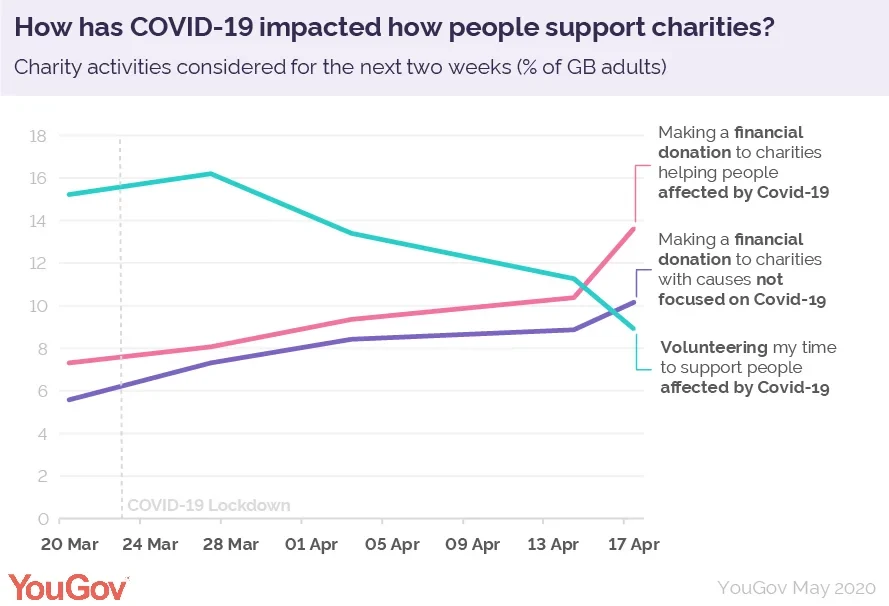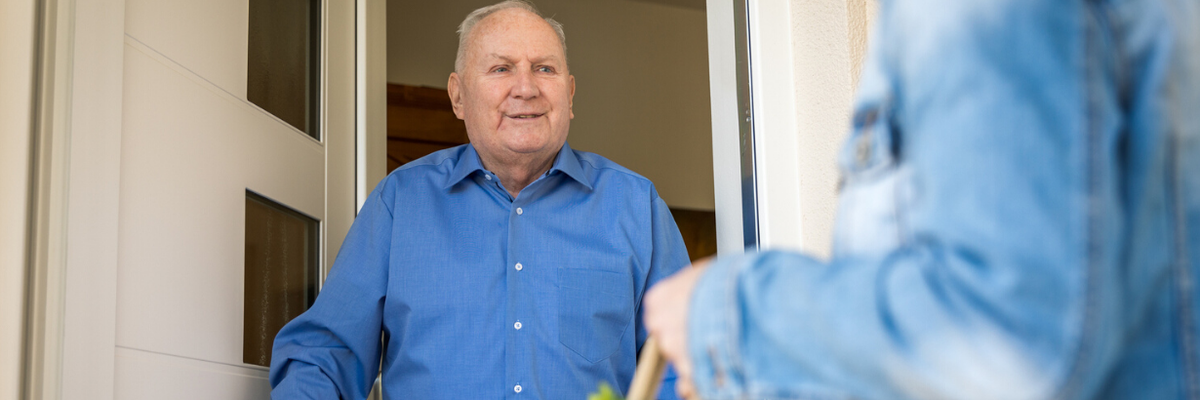More members of the public want to donate to good causes, whether they’re related to coronavirus or not
Charity begins at home – especially during a pandemic. YouGov tracker data shows that while fewer people are considering venturing outside and volunteering their time to those affected by COVID-19, an increasing proportion are thinking about donating money to good causes.
The proportion of Brits who said they were contemplating helping out in person over the next two weeks hit a peak of 16% on March 27. But this declined steadily over the following weeks before ultimately falling to 9% by the 17th.
There may be several reasons why the public are more reluctant to volunteer. Fear of catching COVID-19 has increased over the course of the study, and reports have emerged of medical workers dying from the virus. Brits may well believe their attempts to help are doing more harm than good. There could also be a perception that more helpers simply aren’t needed: the NHS Volunteer Response Service, for example, has been inundated with more than 750,000 applicants – to the point where recruitment was paused on the 29 March 2020.
Nonetheless, our data shows that a significant proportion of the public do want to help. Over the same period of time, Brits became more likely to consider making a financial donation: rising from 7% on March 20th to 14% on April 17. The proportion thinking about donating to non-COVID causes has also increased from 6% to 10% over the same period, and those willing to participate in a fundraising event have doubled from 3% to 6%.

We could partially attribute this rise to the effects of the pandemic on personal spending. YouGov data from just before the lockdown revealed that a plurality of Brits (43%) intend to spend less than they did previously.
While it could be simple belt tightening, our data shows that those who’ve spent less money online recently are more likely to be willing to give money to charity in the next fortnight (those who’ve spent more are also more likely to say they’re willing to donate).
High profile campaigns such as Colonel Tom Moore’s 100th Birthday Walk have earned considerable public attention and inspired (as of this writing) over £30m in donations to the NHS. Brits may also be aware that a number of charity-focused events such as the London Marathon have been postponed – cutting off a potentially valuable source of donations. Those considering a financial contribution could be trying to help bridge the gap.
Charities in crisis: how leading organisations are responding to COVID-19
The government has attempted to account for the coronavirus-related shortfall in donations with a £750m funding package targeted at the third sector. But despite the uptick in consideration, it remains a fraught time for many charities – in some cases, at the precise moment where their services are most needed. If Brits are more willing to donate, which organisations might be major beneficiaries?
BrandIndex data shows a noticeable uptick across several key metrics for charities that can aid those who are either directly or indirectly affected by COVID-19.
Age UK, for example, have focused on the risk the virus poses to older people – launching campaigns and services designed to get food, cleaning essentials, and emotional support to the elderly. As a result of these efforts, its ad awareness scores rose from 6.7 on March 22nd (just before lockdown) to 9.4 nearly a month later (April 20th) and buzz rose from 6.6. to 9.4 over the same period. St John’s Ambulance, the first aid charity, also saw an uptick in certain scores that likely had much to do with its efforts to supply volunteers to the new Nightingale Hospital – and the associated positive media coverage: between March 22nd and April 20, buzz improved from 5.5 to 12.2, and consideration increased from 25.0 to 30.3.
Our research also suggests that a quarter of Brits who rent their homes (26%) aren’t sure if they’ll be able to pay for their accommodation over the next three months. Shelter, a charity that focuses on housing and homelessness, has rolled out advertising designed to help Brits in precarious living situations. Judging from its performance across several key metrics, these efforts have been effective: ad awareness increased from 3.6 to 13.8 between March 22 and April 20 and buzz increased from 3.8 to 10.0.
Learn more about our COVID-19 tracker here











